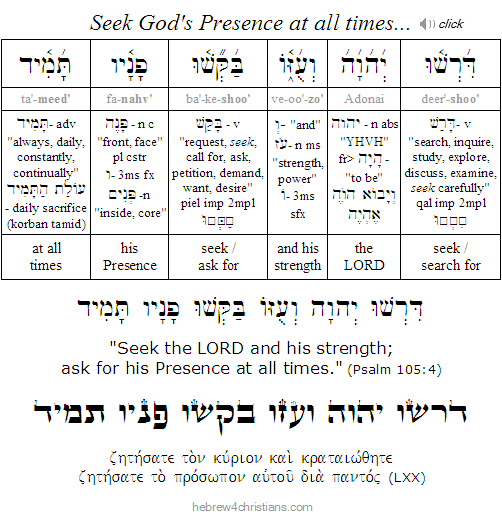|
The idea of seeking "God's face" is an idiom to refer to the Divine Presence and Power, though some of the mystics have said that the metaphor is intended to represent God's attributes of mercy and compassion (ΧΧΧΧ) rather than His attributes of justice (ΧΦ±ΧΧΦ΄ΧΧ). It was the LORD (YHVH) who breathed into man the "breath of life" (Gen. 2:7).
Historically speaking, the verse of our meditation comes from a psalm that was sung after the Ark of the Covenant (ΧΦ²Χ¨ΧΦΉΧ ΧΦΌΦ°Χ¨Φ΄ΧΧͺΦΎΧΦ°ΧΧΦΈΧ) was brought to the Tabernacle of David at Zion (1 Chron. 16:1-36). This connection has led some scholars to regard the idea of "seeking" the LORD as being tied to the priestly avodah performed on behalf of Israel. Semantically speaking, however, the word darash (ΧΦΌΦΈΧ¨Φ·Χ©Χ) has a range of usage in the Scripture, including demanding or requiring something (Gen. 9:5, Psalm 9:12, Deut. 32:21), inquiring or asking God for help (Gen. 25:22, Exod. 18:15; 1 Sam. 9:9), searching carefully for something (Lev. 10:16, Jer. 30:14), investigating the truth of a matter (Deut. 13:14, 17:9), and so on. During the Second Temple period, this verb became associated with searching the Scriptures for God's truth (Ezra 7:10), and by Talmudic times, it primarily meant to study the Torah (and by implication, the writings of the early sages). Hence a "midrash" (from the same root) referred to a study of Scripture, a "bet midrash" was a house of study (school), a "drasha" was a sermon, and so on. Indeed, in modern times the phrase "dirshu Hashem v'uzo" has come to mean the study of the Torah that gives strength. Among orthodox Jews, "Dirshu Hashem v'uzo, bakshu panav tamid" means that we are to seek Hashem, His Torah and His countenance always, primarily through Talmud Torah - the study of the Torah.
Finally, the Hebrew verb darash may be etymologically related to an earlier root (i.e., darakh: ΧΦΌΦΈΧ¨Φ·ΧΦ°) that means "to walk" or "tread" (the noun form, i.e., derekh: ΧΦΌΦΆΧ¨ΦΆΧΦ°, means "pathway," or "journey"). This would seem to imply that seeking the LORD is expressed through the walk of faith as expressed by our decisions.
<< Return
|




